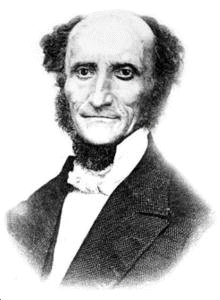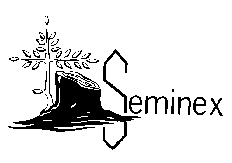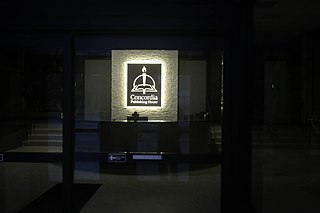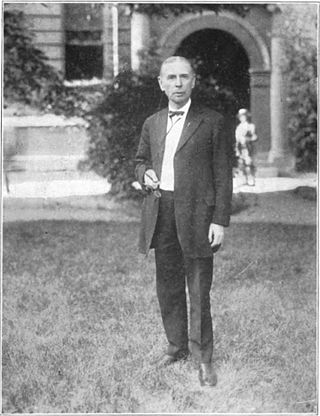Related Research Articles

The Lutheran Church – Missouri Synod (LCMS), also known as the Missouri Synod, is a confessional Lutheran denomination in the United States. With 1.7 million members as of 2022 it is the second-largest Lutheran body in the United States, behind the Evangelical Lutheran Church in America. The LCMS was organized in 1847 at a meeting in Chicago, as the German Evangelical Lutheran Synod of Missouri, Ohio, and Other States, a name which partially reflected the geographic locations of the founding congregations.

Carl Ferdinand Wilhelm Walther was a German-American Lutheran minister. He was the first president of the Lutheran Church – Missouri Synod (LCMS) and its most influential theologian. He is commemorated by that church on its Calendar of Saints on May 7. He has been described as a man who gave up his homeland for the freedom to speak freely, to believe freely, and to live freely, by emigrating from Germany to the United States.

Concordia Theological Seminary is a Lutheran seminary in Fort Wayne, Indiana. It offers professional, master's degrees, and doctoral degrees affiliated with training clergy and deaconesses for the Lutheran Church–Missouri Synod (LCMS).

Concordia Seminary is a Lutheran seminary in Clayton, Missouri. The institution's primary mission is to train pastors, deaconesses, missionaries, chaplains, and church leaders for the Lutheran Church–Missouri Synod (LCMS). Founded in 1839, the seminary initially resided in Perry County, Missouri. In 1849, it was moved to St. Louis, and in 1926, the current campus was built.

Seminex is the widely used abbreviation for Concordia Seminary in Exile, which existed from 1974 to 1987 after a schism in the Lutheran Church–Missouri Synod (LCMS). The seminary in exile was formed due to the ongoing Fundamentalist–Modernist Controversy that was dividing Protestant churches in the United States. At issue were foundational disagreements on the authority of Scripture and the role of Christianity. During the 1960s, many clergy and members of the LCMS grew concerned about the direction of education at their flagship seminary, Concordia Seminary, in St. Louis, Missouri. Professors at Concordia Seminary had, in the 1950s and 1960s, begun to utilize the historical-critical method to analyze the Bible rather than the traditional historical-grammatical method that considered scripture to be the inerrant Word of God.

The Concordia Lutheran Conference (CLC) is a small organization of Lutheran churches in the United States which formed in 1956. It was a reorganization of some of the churches of the Orthodox Lutheran Conference (OLC), which had been formed in September 1951, in Okabena, Minnesota, following a break with Lutheran Church–Missouri Synod (LCMS). It is the remaining successor of the Orthodox Lutheran Conference. The current president is David T. Mensing, pastor of Peace Evangelical Lutheran Church in Oak Forest, Illinois. All members of the board of directors serve one year terms. The CLC has five congregations and is in fellowship with nine mission congregations in Russia and Nigeria.

Concordia Publishing House (CPH), founded in 1869, is the official publishing arm of the Lutheran Church–Missouri Synod (LCMS). Headquartered in St Louis, Missouri, at 3558 S. Jefferson Avenue, CPH publishes the synod's official monthly magazine, The Lutheran Witness, and the synod's hymnals, including The Lutheran Hymnal (1941), Lutheran Worship (1982), and Lutheran Service Book (2006). It publishes a wide range of resources for churches, schools, and homes and is the publisher of the world's most widely circulated daily devotional resource, Portals of Prayer. Its children's books, known as Arch Books, have been published in millions of copies. Concordia Publishing House is the oldest publishing company west of the Mississippi River and the world's largest distinctly Lutheran publishing house.

Franz August Otto Pieper was a Confessional Lutheran theologian who also served as the fourth president of the Lutheran Church – Missouri Synod, known at that time as the German Evangelical Lutheran Synod of Missouri, Ohio, and Other States.

Christian Cyclopedia is a one-volume compendium of theological data, ranging from ancient figures to contemporary events. It is published by Concordia Publishing House as an update to the Concordia Cyclopedia of 1927, authored by Ludwig Fuerbringer. The 1927 version was an update to The Lutheran Cyclopedia, edited by Henry Eyster Jacobs and Charles A. W. Haas, of the General Council and its Lutheran Theological Seminary at Philadelphia. Because the shift from the 1898 to 1927 versions occurred between different denominations of Lutherans, the point of view for certain articles shifted accordingly. However, other articles have barely changed at all between even the 1898 and 2000 Cyclopedias.

Robert David Preus was an American Lutheran pastor, professor, author, and seminary president.

Otto Fuerbringer was an editor for the American news magazine Time.
William Frederick Beck was an American Lutheran minister best known for his biblical translation, The Holy Bible, An American Translation.
Robert Reed Lessing was born and raised in Denver, Colorado. He graduated from St. John's College in Winfield, Kansas, in 1981 and finished graduate work at Concordia Seminary in St. Louis in 1986. He was ordained into the Office of the Holy Ministry on June 29, 1986, at Christ the Servant Lutheran Church, West Monroe, Louisiana. Reed served as the church's pastor until March 1990. From March 1990 to August 1999 he was the pastor of Trinity Lutheran Church, Broken Arrow, Oklahoma.
Louis John Sieck was a Lutheran minister. He was the president of Concordia Seminary in St. Louis from 1943 to 1952.

Concordia College was an educational institution of the Lutheran Church–Missouri Synod (LCMS) whose main purpose was to prepare men to enter one of the synod's seminaries. It was founded as a German-style gymnasium in Perry County, Missouri, in 1839. It was moved to St. Louis, Missouri, in 1847, and ultimately to Fort Wayne, Indiana, in 1861. In 1935, the high school department of the school was separated from the junior college to form Concordia Lutheran High School. Concordia College was closed in 1957 when the LCMS opened Concordia Senior College on a new campus in Fort Wayne..The former campus was purchased by the Indiana Institute of Technology.
Heinrich "Henry" Sieck was a German-American Lutheran minister, writer, and college president.
Alfred Ottomar Fuerbringer was an American Lutheran minister and college president.
Karl L. Barth was the eighth president of Concordia Seminary in St. Louis, Missouri, from 1982 to 1992.
G. Christian Barth was an American Lutheran minister and seminary president.
The following is a timeline of significant events in the history of the Lutheran Church – Missouri Synod.
References
- 1 2 "Dr. Fuerbring Dies; Once Seminary Head". St. Louis Post-Dispatch. May 6, 1947. p. 3C.
- 1 2 Meyer, Carl S. (1965). Log Cabin to Luther Tower: Concordia Seminary during one hundred and twenty-five years toward a more excellent ministry 1839-1964. St. Louis, Missouri: Concordia Publishing House. OCLC 384320.
- ↑ Who's who in the Central States. Mayflower Publishing Company. 1929. p. 340.
- ↑ "Lutheran Synod Commends Dr. Ludwig Fuerbringer". St. Louis Post-Dispatch. June 18, 1943. p. 3C.
- ↑ "Agnes M. Fuerbringer; Taught 48 Years". St. Louis Post-Dispatch. 1985-04-25. p. 21. Retrieved 2023-01-23.